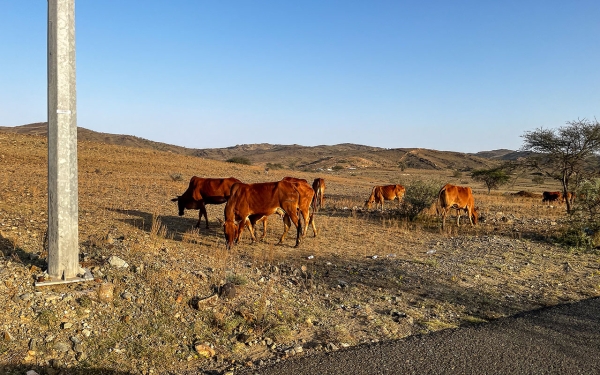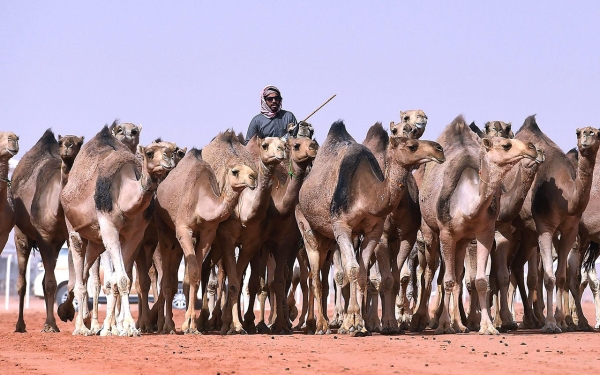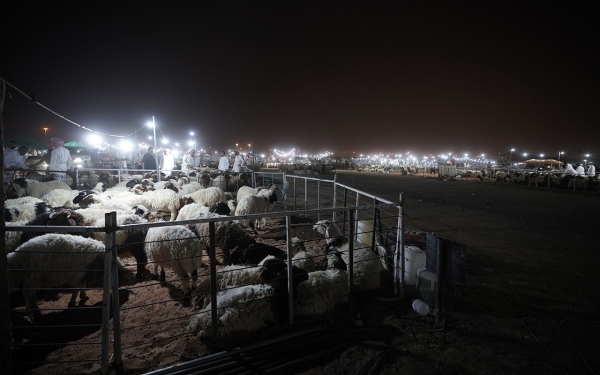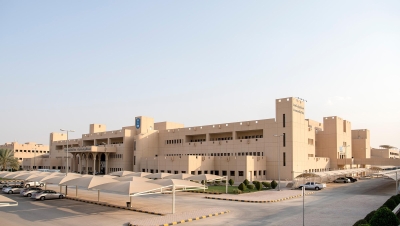



Pastoral Farming in the Kingdom of Saudi Arabia is the practice of raising sheep, cows, or camels. These animals are herbivorous and domesticated mammals, primarily utilized for their meat and milk, for obtaining wool, leather, and other products, or for producing labor. Additionally, certain livestock, like camels, are used for transportation, trade purposes, and agricultural activities.
Pastoral farming across cultures and time periods
Livestock is globally defined as domesticated animals raised in an agricultural environment to produce labor and commodities. The same term is used to refer to animals raised for consumption. In many cultures since humanity's transition to agriculture, pastoral farming has been considered a lifestyle that relies on agriculture. Pastoral farming practices have varied widely across cultures and time periods, and they still play a major economic and cultural role in many societies.
Significance of pastoral farming in Saudi culture
Throughout history, camels have been an icon of pastoral farming in the culture of the Arabian Peninsula in general, and the Kingdom in particular. Various mechanisms were developed to adapt to the desert environment. Pastoral farming has been valued as a stable source of income in most dry areas of the Kingdom. The majority of pastoral farming practices, specifically involving camels and sheep, are linked to the traditional lifestyle of most Saudi families in the past, who relied on their livestock for food and trade. Throughout its history, the Kingdom's traditional markets have embraced the livestock trade, along with many related goods, such as slaughter markets, food, clothing, and handicrafts. These markets stretched over vast areas near pastures.
Classification of pastoral farming in the Kingdom
Camel breeding is considered an intangible popular heritage according to the Ministry of Culture’s classification. It is linked to various activities and fields related to cultural and heritage tourism within the national cultural competitions in the Kingdom. Camel breeding and riding are also regarded as national cultural heritage, which the ministry seeks to preserve, rehabilitate, and develop according to its vision. The Ministry of Culture has designated 2024 as the “Year of the Camel” to celebrate the unique cultural value that camels represent in the lives of the people of the Arabian Peninsula in general, and the Kingdom in particular. Livestock are raised collectively in temperate climates, including the arid and desert regions of the Kingdom. Farmers build fences, housing, and barns to preserve their property, such as water, fodder, transportation, and pest control. Most farms are managed so that sheep can graze on open pastures, sometimes under the control of a shepherd or a sheepdog.
Pastoral farming areas in the Kingdom
In the agricultural context, sheep farming takes place on farms with different structures, primarily devoted to the practice of pastoral farming and the raising of domestic animals. Although there are other farms that are not primarily designed for pastoral farming, most of them are considered places for livestock farming.
Suitable lands for pastoral farming in the Kingdom
Many administrative provinces of the Kingdom have lands whose agricultural environments are suitable for the economic activity of pastoral farming. It may be the main activity in some areas. Pastoral farming is prevalent in the plains southwest of the Kingdom, such as in al-Bahah Province and Aseer Province. Agricultural activity is prevalent in the highlands that constitute agricultural terraces, and mountains covered with juniper trees, in addition to fruit, grain, and fodder farms.
Pastoral farming profession in the Kingdom
In practice, the pastoral farming profession is considered an official profession in the Kingdom, according to the classification of the General Authority for Statistics. Those who practice it are referred to as stock farmers, and their primary task is to engage in pastoral farming in accordance with the regulating policies. As part of their job duties, a stock farmer is obligated to follow health, safety, environmental, and public health policies and procedures.
Most of the tasks of stock farmers involve selecting and mating animals, artificial insemination, and managing births. They determine the numbers and types of animals to be bred, maintain records of breeding and pedigrees, and keep information such as weights, growth patterns, and healthy diets. They also perform tasks related to production, such as milking cows, shearing sheep, or training horses, as well as handling livestock or their products, storing them, selling them, and organizing their transfer to customers when necessary. According to the Saudi Occupational Classification, stock farmers are required to have at least an intermediate school certificate and to possess behavioral and technical competencies.
Pastoral farming services and programs in the Kingdom
In the governmental context, the Agricultural Development Fund, as part of its services in the financing sector, offered a request to finance stock farmers. This program aims to support small stock farmers within the sustainable agricultural rural development initiatives, launched under the new edition of the agricultural subsidies program, in conjunction with Saudi Vision 2030. The goal is to maximize the benefit from food support by directing it to eligible recipients.
Operational development loans for stock farmers
The Agricultural Development Fund's services include providing operational development loans to stock farmers, specifically targeting small stock farmers. This service is aimed at individuals interested in raising livestock who are registered with the Ministry of Environment, Water, and Agriculture. The program targets small stock farmers (with fifty-250 heads of livestock). Financing service is available only to individuals who are not employees in the private or public sectors and who are at least twenty-one years old. Additionally, applicants must attend an introductory workshop in pastoral farming to obtain financing. The service is one of the agricultural activities supporting the local market and is directly linked to the debtor relations sector.
Stock farmers committee in the Kingdom
In 2016, the Ministry of Environment, Water, and Agriculture established a committee for stock farmers in the Kingdom to formulate policies related to pastoral farming, find solutions to the obstacles they face, and guide experienced livestock owners in obtaining approval to lease land for stock farmers. This initiative involves allocating land around cities and villages for the establishment of pastoral farming complexes and providing veterinary services through the ministry.
Supporting pastoral farming in the Kingdom
The Ministry of Environment, Water, and Agriculture has supported the concept of the stock farmer profession and entrepreneurship through the Agricultural Development Fund. This initiative aims to promote professional pastoral farming and establish technical specifications for various types of feed (green, grains, and compound feeds). This effort is conducted in collaboration with the Saudi Food and Drug Authority to ensure the quality monitoring of feeds through effective communication channels maintained between the ministry and the committee. Additionally, the ministry has standardized prices for veterinary medicines and mandated that drug information must be provided in Arabic, in coordination with the Saudi Food and Drug Authority. These measures have incentivized stock farmers to establish cooperative societies, fostering efforts and collaboration to meet needs, provide services, and collectively market their products. Stock farmers are also connected to an electronic portal for livestock services, facilitating access to field services such as vaccine distribution and veterinary medicines.
Controls for importing live livestock into the Kingdom
In 2019, the Ministry of Environment, Water, and Agriculture announced ten new controls and mechanisms for importing live livestock. These measures included setting standard weights for each category of livestock (sheep, goats, cows, and camels) aimed at reducing fodder depletion upon entry into the Kingdom and mitigating the impact of reduced fodder cultivation on pastoral farming. They also apply to all inbound consignments according to the epidemiological situation of each country. Since 2019, the ministry has implemented these new mechanisms across all entry points, specifying specific weights for different breeds: Thirty-five kg for sheep (Awassi and Sawakni), twenty-five kg for Barbary sheep, twenty kg for goats, 280 kg for cows, and 200 kg for camels. The concept of importing livestock into the Kingdom requires obtaining an import permit, adhering to health requirements in the country of origin, following quarantine procedures at entry ports, and demonstrating compliance with the environmental sustainability program (standard livestock weights and executing procedures for weighing consignments and vaccination).
Numbers of livestock in the Kingdom
The total number of sheep in agricultural holdings in the Kingdom, according to the results of the agricultural production survey for 2018 conducted by the General Authority for Statistics, reached 9,396,449 heads. Milking females (one year and older) represent 57.7 percent of female sheep, and al-Nuaimi breed constituted the highest percentage among breeds at 39.7 percent of the total sheep in the Kingdom.
The number of goats in agricultural holdings reached 3,607,524 heads. Milking females (one year or older) account for 51.4 percent of female goats, and the local breed represents the majority at 97.9 percent of the total goats in the Kingdom. The number of camels in agricultural holdings reached 487,823 heads. Milking females (four years and older) represent 48.3 percent of female camels, and the local breed dominated with 94.9 percent of the total camels in the Kingdom. The total number of cows in agricultural holdings reached 30,891 heads (excluding cows in specialized cattle farms). Milking females (two years and older) represent 54 percent of cows, and the highest percentage of local breed cows stands at 90 percent of the total cows in the Kingdom.
Related quizzes

